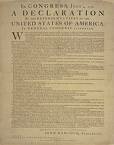Online Censorship Law Struck Down As Unconstitutional
Published by Staff March 23rd, 2007 in Internet.
A federal court in Philadelphia on March 22 stuck down the Child Online Protection Act (COPA), ruling that the law is unconstitutionally broad and would limit free speech. The law, passed in 1998, outlawed the transmission of material that is harmful to children in vague terms and could have been used to censor protected speech. People For the American Way Foundation participated in two amicus curiae briefs in the case, which went to the Supreme Court twice.
People For the American Way Foundation Associate Legal Director Judith E. Schaeffer issued the following statement.
The court’s ruling is a victory for free speech. COPA was written so vaguely that the distribution of any number of legitimate materials could have been subject to its penalties. Websites offering information about reproductive rights, health, and arts could all have been censored by COPA. The court recognized this and made a wise decision in its ruling.
We have a responsibility to make sure that children are safe online, but we dont need to suppress free speech in order to do it. Narrowly tailored legislation and products like web filters can make a powerful contribution to parents efforts to protect kids. Laws that might or might not outlaw an image of Michelangelos David dont.
Source: PFAW
0 Responses to “Online Censorship Law Struck Down As Unconstitutional”
Please Wait
Leave a Reply